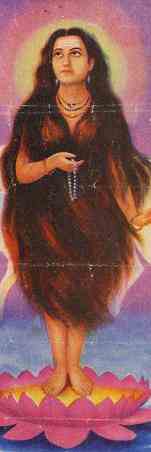Akka Mahadevi
Akka Mahadevi was born about 1150 A.D. at Udutadi, in Shivamogga District of present day Karnataka. Her parents, Nirmalshetti and Sumati, were great devotees of Shiva. Akka Mahadevi, even when a young child, displayed her religious proclivities. She was a paragon of beauty and princess of lyrical poetry. Her vachanas or sayings are a poetic testament of her mind's reaction to the wonder and awe of existence. Though the same wonder and poetry are there in her sayings, yet they are deepened and widened by the calm of meditation. Keen spiritual longing shifts the emphasis from the wonder of the outside universe to the significance of the self within. The quest for God, her favourite Channamallikarjuna, rekindled the emotional exuberance of her early poetic genius and compelled her inwards to explore the infinite depths of the soul in which the central principle of creation or God is reflected. She measured the heights of philosophical imagination, yet she did not remain content with the mere intellectual curiosity, she sought more and more a centre of reference in God whom she approached through ardent love and devotion. She instinctively felt that man can never be fully and wholly fulfilled through self-discipline and knowledge, though self-discipline is arduous and knowledge superior. A more human approach to God lies through pure love and unselfish love which withdraws most of the obstacles that the ego interposes between the divine and the devotee.

